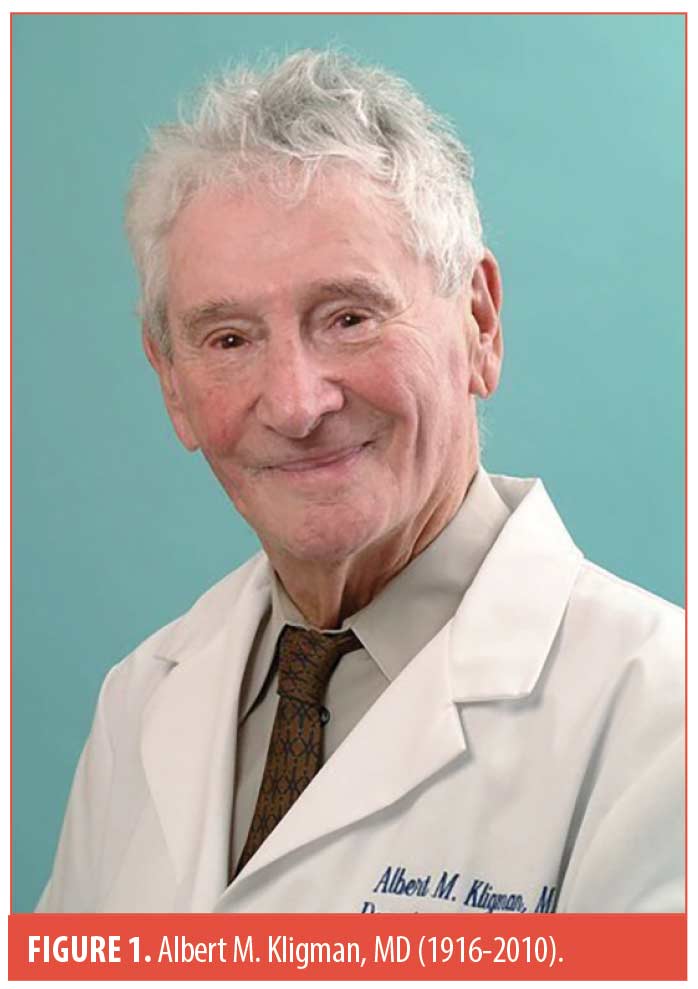 Albert M. Kligman, MD (1916-2010): A Controversial Genius in the Field of Dermatology
Albert M. Kligman, MD (1916-2010): A Controversial Genius in the Field of Dermatology
J Clin Aesthet Dermatol. 2023;16(1):13
Dear Editor:
Albert M. Kligman was a legend in the field of dermatology. He was the first dermatologist to elucidate a correlation between sun exposure and the development of rhytids, as well as discovering topical tretinoin.1 Some of his most controversial research involved using Holmesburg prisoners as experimental subjects in Philadelphia from 1951 to 1974.1

Dr. Kligman was born on March 17th, 1916, into a poor Russian immigrant family in Philadelphia.2 He graduated from the University of Pennsylvania School of Medicine in 1947 and completed residency in dermatology in 1950.2 He subsequently became a professor of dermatology at the University of Pennsylvania.2 During his time there, he established the protocol for periodic acid Schiff staining, and published the “maximization test” paper, for ranking skin contact sensitizers, among many other publications.2
Dr. Kligman performed research on human subjects at Holmesburg Prison in Philadelphia.3 The inmates underwent experimentation using pharmaceuticals including tretinoin, dioxin, and components of Agent Orange.3 In a 1966 interview with the Philadelphia Inquirer, referring to the prison, Kligman was quoted saying “All I saw before me were acres of skin. I was like a farmer seeing a fertile field for the first time.”1 He performed experiments using detergents, soaps, radioactive and hallucinogenic compounds, and infected subjects with herpes simplex virus, vaccinia, human papillomavirus, and candida.3 He infected children with intellectual disabilities with Microsporum audouini and Microsporum canis.3 At the time, these studies were conducted without formal ethical review.3
Kligman’s practices, along with other unethical scientific practices in the 1900s, led the United States government to become involved in protecting research subjects.3 In 1962, the Kefauver-Harris amendments included a requirement for patient informed consent.4 By 1978, The National Commission for the Protection of Human Subjects of Biomedical and Behavior research passed a regulation providing protection to prisoners from unethical research practices, largely due to Dr. Kligman’s prison research.4 By the 1990s, federal policy became much more consistent across governmental agencies for the protection of human subjects.4 What we currently take for granted with the protection of human subjects came about because of past abuses, including the research performed by Dr. Kligman. Medical studies in the United States now often require that investigators be trained in Good Clinical Practices (GCP) to help ensure safety, integrity, and quality of experimental research.4
After a book on the Holmesburg experiments was published in 2000, several former prisoners attempted to sue Dr. Kligman and the University of Pennsylvania for intent to harm.3 The lawsuit was dismissed under the statute of limitations.1
The discovery of the dermatological uses of tretinoin, with the help of Dr. James Fulton and Dr. Gerd Plewig, were among Dr. Kligman’s most pivotal contributions to the field of dermatology.3 He also coined the term “photoaging,” discovering many of the mechanisms by which ultraviolet light damages the skin.1 Dr. Kligman passed away in 2010 from cardiovascular disease but his legacy in the field of dermatology and medical ethics remains to this day.1
With regard,
by Jarett Casale, DO; Alexandra Taylor, BS; and Jonathan Crane, DO FAAD
Affiliations. Ms. Taylor and Dr. Crane are with Campbell University School of Osteopathic Medicine in Lillington, North Carolina. Dr. Casale is with Campbell University at Sampson Regional Medical Center in Clinton, North Carolina. Dr. Crane is additionally with Campbell University at Sampson Regional Medical Center in Clinton, North Carolina.
Funding. No funding was provided for this article.
Disclosures. The authors report no conflicts of interest relevant to the content of this article.
Keywords. Kligman, Albert, retinoids, ethics, ethical, tretinoin, prison, prisoners, research
Forkhead Box Class O3A Gene Polymorphism and Psoriasis
J Clin Aesthet Dermatol. 2023;16(1):E53
Dear Editor:
We would like to share ideas on the publication “The Association Between Forkhead Box Class O3A Gene Polymorphism and Psoriasis and Its Relationship with Psoriasis Severity.” Abd Elneam et al1 looked at the potential association between the FOXO3a genetic polymorphism and the severity of the psoriasis vulgaris condition. According to Abd Elneam et al, the FOXO3a gene’s rs13217795 polymorphism is highly linked to psoriasis susceptibility, and patients with severe psoriasis have significantly greater serum levels of FOXO3a than those with mild-to-moderate psoriasis. Future targeted therapy may focus on this discovery. We both agree that the investigation’s underlying genetic component may be important to psoriatic problems. However, the condition may or may not have a hereditary component. It’s critical to keep in mind the implications of additional confounding factors, especially for the other genetic polymorphisms. Examples include the T/t genotypes at the vitamin D receptor gene and the SOCS3 and SOCS7 polymorphisms.2–3 Understanding the significance of unanticipated and potentially perplexing gene mutations should be the main objective of future study.
With regard,
by Amnuay Keebayoon, PhD, and Viroj Wiwanitkit, MD
Affiliations. Dr. Keebayoon is a Private Academic Consultant in Samroang, Cambodia. Dr. Wiwanitkit is with Dr. DY Patil Medical College and Dr. DY Patil Vidyapeeth in Pune, India.
Funding. No funding was provided for this article.
Disclosures. The authors report no conflicts of interest relevant to the content of this article.
References
- Abd Elneam AI, Alhetheli G, Al-Dhubaibi MS, et al. The Association Between Forkhead Box Class O3A Gene Polymorphism and Psoriasis and Its Relationship with Psoriasis Severity. J Clin Aesthet Dermatol. 2022 Aug;15(8):22–26.
- Özçep M, Atsü N, Solak N, et al. Lack of association between SOCS3 and SOCS7 polymorphisms and psoriasis. Immun Inflamm Dis. 2022 Oct;10(10):e695.
- AbdElneam AI, Al-Dhubaibi MS, Bahaj SS, et al. TaqI polymorphism T/t genotypes at the vitamin D receptor gene (VDR) are associated with increased serum vitamin D levels in mild and moderate psoriasis vulgaris: A pilot study. J Gene Med. 2022 Sep 15:e3449.

